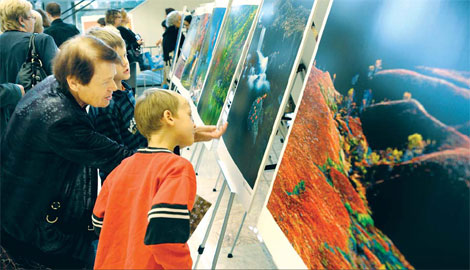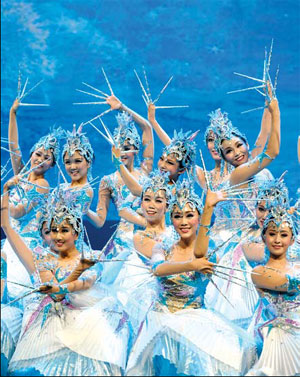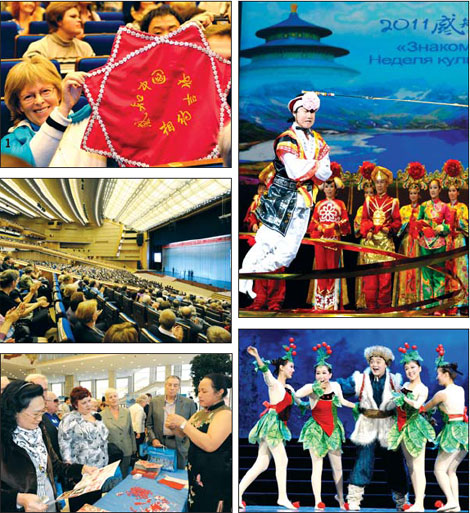Jilin delegation wins 'honor for the entire nation'
|
Russians get a close look at paintings and photographs on exhibit in the front hall of the Kremlin Grand Theater, showing scenes of the economy, society, and daily lives of the people of Jilin province, in China's Northeast. |
Province wows Moscow with display of local folk culture
The night of September 21 was unforgettable for Liu Chunmei and the other members of the Jilin Provincial Song and Dance Ensemble - they were performing at the Kremlin Grand Theater, in Moscow, the first time they had ever been on such a famous stage.
Liu and her team launched into a performance of the "Spirit of the Changbai Mountains", a medley of folk songs and dance, coupled with a modern stage setting, to give the audience a taste of the scenery of Jilin province and the lives and customs of the people there.
Some 6,000 audience showed their appreciation, saying the show was a rousing success. It was also the opening ceremony of the 2011 "Experience China" Trip to Russia- Jilin Cultural Week, which ran from September 21 to 25.
The "Experience China" program is a cultural exchange activity organized by China's State Council Information Office, to give the outside world a taste of Chinese culture. This year it focuses on Jilin province in the Northeast, which borders Russia.
Before the opening ceremony, there was a painting and photography exhibit in the front hall of the Kremlin Grand Theater that showed scenes of economic, social, and other daily activity in Jilin.
The audience told the press afterwards that they had fallen in love with the northeastern province and the scenic Changbai Mountains.
"I can't help wanting to go skiing in Jilin and to see the frost and snow there," remarked one young man named Vladimir.
|
A soiree for the opening ceremony of the Culture Week offered this special performance. Photos by Jiao Shuman / For China Daily |
Li Meng, a Chinese boy who is studying in Russia said that his teachers had gained a greater understanding of Chinese culture thanks to culture week and that he himself felt proud of it.
Present for the opening ceremony and the extravaganza were the Chinese ambassador to Russia, representatives of the Russia-China Friendship Association, Moscow government officials, Russian celebrities, and Chinese working in Russia.
Mikhail Titarenko, the chairman of the Russia-China Friendship Association, praised the performance, saying it perfectly embodied Chinese cultural characteristics.
The vice-chairman of the association, Galina Kulikova,commented on the show's combining of all the best features of China's Northeast, and that it would have been bad to miss it.
Zhang Haizhou, minister of China's embassy in Russia, called the performance brilliant, and said it made him proud to show the ability of the Jilin ensemble and give Russians a new understanding of Chinese art.
"What you represent is not only Jilin province, but China," Zhang told the performers afterwards, "You've won honor for our nation and are the pride of the country."
Promoting Jilin
Cultural Week was not lacking a slightly more serious side. It came with a business meeting that promoted Jilin's culture industry, where two of the province's companies signed cooperative deals with some Russian counterparts.
A forum was held in September 22 when officials from the Russian Culture, Publication, and Mass Media bureaus; national TV and broadcasting representatives; and people in the arts, media and tourism came together to discuss bilateral communications and future cooperation in the culture industry.
There was also an open-air cultural affair, where Jilin folk artists made paper cuttings and carvings and drew pictures for the Muscovites to display the craftsmanship and another side of the province's cultural heritage.
Other activities included parties for young Chinese and Russian artists and a folk music concert.
The Information Office also donated some 1,000 books to Russian State Social University.
Culture Week had some fairly intensive coverage by Chinese and Russian media, including the Xinhua News Agency, People's Daily, China Central Television (CCTV), the China News Service, China Radio International, Guangming Daily, Russian Cultural TV and Izvestia, one of Russia's most important newspapers.
The opening ceremony was also covered by CCTV's prime time news program.
The online media also did their part to cover Culture Week, and a search for "Jilin Culture Week" on Google turned up more than 7.2 million hits, while on Baidu, the major Chinese search engine, it revealed 510,000 hits.
The Jilin delegation totaled 110 people, making Culture Week the first time for it to have such a large cultural exchange abroad, and the first time for the province to hold the activity at the national level.
Local officials said that they were grateful for all the help that the Chinese embassy and Moscow authorities gave them. They had provided them with greater assurance in holding the activities in such an unfamiliar setting.
The success has also bolstered the provincial government's morale and it is planning to turn the cultural activity into an annual, name-brand event to share with other Asian countries.
But, Jilin is not just obsessed with "going out" and selling itself, it also wants to invite foreign countries to come and promote cultural exchanges, for example at "Northeast Asia Cultural and Art Week", which is held in the provincial capital Changchun every year.
|
Clockwise from upper left: Russians excited about the folk art performance; artists from Jilin province performing at a soiree for the opening ceremony of Russia-Jilin Culture Week in Moscow, giving the audience a taste of Jilin life; Jilin artists perform at the evening party; Jilin folk artists make paper cuttings for the Muscovites to display their craftsmanship; the opening ceremony of the Russia-Jilin Culture Week. |
(China Daily 10/21/2011 page15)

















